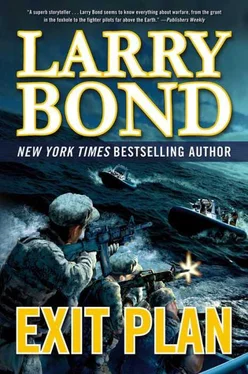“May Allah guide you in your investigation, my son,” responded Badar, pleased by Rahim’s compliments.
* * *
Dahghan was sitting across the street, watching the last bit of sunlight fade, when he saw Rahim emerge from the house. He quickly jumped to his feet and trotted over to the car.
“Was the meeting with the mullah useful, sir?” he asked.
“Actually, yes. Yes it was. I want you to put out an alert for the van that is described on page three of this report. I believe the traitors commandeered the van after eliminating the Basij patrol that was using it,” answered Rahim, satisfied. He handed the folder to his assistant and climbed into the car.
Dahghan took the folder and placed it in his case. After getting into the car, he turned to Rahim and said, “Where to next, Major?”
“Back to Kangan. I have a lot of thinking to do, and I need to speak with Tehran again.”
“Sir, you’ve had almost nothing to eat today, and you ate sparingly yesterday as well. I suggest you get something to eat here. There is a nice café up the road. I can order us something while you make your call to Tehran.”
Dahghan’s suggestion made Rahim realized that he was indeed very hungry, and the chickpea cookies the mullah had served with tea only reminded his stomach that it was empty. He paused to think through the impact of staying in Tahari a little longer. By nature, Rahim analyzed everything, even with something as mundane as deciding when to eat. His primary concern was getting the data on the van to headquarters; a task he could do just as well from a café table as his desk. “You make a reasonable observation, Dahghan. Proceed.”
The café was only a few minutes away and while Dahghan ordered lamb stew with rice and flatbread, Rahim walked across the street for some privacy. He made the call to the headquarters in Tehran, read off the specifics on the van, and ordered that the information be disseminated widely. He emphasized, however, that the Basij, Pasdaran, and VEVAK units to the southeast were to have priority. Rahim also instructed the desk agent to issue a warning to alert the police and security services that Akbari and Naseri were probably not alone, and that their accomplices were likely well-armed and dangerous. After confirming there was nothing new from Bandar Charak, Rahim closed his cell phone and returned to the café.
Upon entering the small restaurant, his sense of smell was inundated with savory aromas and his stomach growled with anticipation. Dahghan was seated at a small table, already laden with steaming dishes. Rahim was pleased with the promptness of the waiter, and he eagerly began piling food onto his plate. He had only taken a couple of bites when his cell phone rang. Glancing at the display, he didn’t recognize the number.
“Major Rahim,” he answered.
“Major, this is Agent Sattari.”
“Yes, Agent Sattari, I’m surprised to hear from you. Is Omid still so mad at me that he won’t speak to me personally?”
“Sir, Senior Agent Omid is dead.” Sattari’s voice wavered as he spoke.
Rahim almost dropped his fork when he heard the news. Gently, he placed it on the plate; his hunger had suddenly vanished. “What happened?”
“We were investigating the Naseri raid when Omid became suspicious that the two traitors may have shown up at the house soon after the fighting. We grabbed some Basij fighters and split up to search the northwestern quarter. We received reports that led Omid to believe the couple had used different routes in and out of the city. He took his Basij and headed north of town along the road that runs in to Highway 96. I continued eastward to cover the other possible options. I received a call from him at 1834, but he didn’t respond when I answered. I proceeded quickly to his location and found him, and the four Basij fighters dead from gunshot wounds.”
“I see,” replied Rahim flatly. “What actions have you taken, Agent Sattari?”
“I’ve secured the scene and I have Pasdaran patrolling along the road and in the dunes to the east. There was no sign of the assailants, but the truck that Omid and the Basij were using is missing. There were no witnesses and we didn’t see any vehicles on the road.”
Rahim looked down at his watch, it was 1913. The traitors had nearly three-quarters of an hour head start. “You mean you didn’t see any lights, correct?”
“Yes, Major. I sent Basij patrols twenty kilometers down both ways on Highway 96. They returned moments ago and reported seeing nothing on the road.”
Rahim sighed with frustration; Sattari was young and inexperienced. He didn’t realize that his quarry was almost certainly using night-vision devices. “Any other observations?”
“Only one, sir. Whoever the murderers were, they were excellent marksmen. Agent Omid was found lying behind a Basij fighter, a single gunshot wound to the head. Two of the Basij fighters also had only one wound. Captain Akbari couldn’t have done this alone, Major. He must have had accomplices.”
“Your observation is correct, Agent Sattari. I’ve only recently issued just such a warning, as it would appear that the same criminals are responsible for the loss of a Basij patrol in Bandar Tahari.”
“What are your orders, sir?” Sattari asked. There was a note of determination in his voice.
“Have you alerted your home office yet?”
“Yes, sir. But given the circumstances I felt it was wise to call you directly.”
“I commend your initiative, Agent Sattari.” Rahim was genuinely impressed. Most agents had the bad habit of following the rigid command structure without question; this young agent had jumped the tracks when he had to. “Continue your investigation. I will leave for Bandar Charak immediately. It’ll be several hours before I can get there, and I will want a detailed report as soon as I arrive. Is that understood?”
“Clearly, Major.”
“One more thing, Agent Sattari. Have your search parties keep an eye out for a medium-sized, white panel van with Tahari plates. I suspect you will find it nearby.”
“Yes, sir. Do you have a license plate number?”
Rahim passed on the information, signed off, and slowly closed his cell phone.
“What is it?” asked Dahghan. He witnessed Rahim’s abrupt transformation and was curious, as well as concerned.
“Senior Agent Omid and four Basij were just gunned down outside of Bandar Charak. Pay our bill. We leave immediately for Bandar Charak.”
“Yes, sir.” The young man shot out of his chair and flagged the café’s owner.
Rahim sat there stunned; his feelings mixed. Omid wasn’t a friend, but he was a talented and loyal agent who had served Iran well. His death would be one more reason to justify the elimination of the traitors Akbari and Naseri, as well as the now certain Americans.
Out of the corner of his eye, Rahim saw Dahghan head for the door. As he left the café, he hit the speed-dial number for Moradi. He would only have a little time before they would be out of range of the cell phone tower. The general answered on the second ring.
“General Moradi.”
“Sir, Major Rahim. I have little time, so I will be brief. There are Americans on our soil. They have just gunned down a senior VEVAK agent and four Basij fighters at Bandar Charak. I’m on my way now to lead the manhunt.”
“You’re sure of this, Hassan?”
“Positive. The initial report from the field clearly indicates excellent marksmanship and the likely use of night-vision devices. These are trademarks of U.S. commandos. When added to the body and the binder cover we found, there can be only one logical conclusion, sir.”
“I’ll issue an alert to all Pasdaran units. I will make it clear that the two traitors have well-armed, foreign military accomplices,” responded Moradi.
Читать дальше












